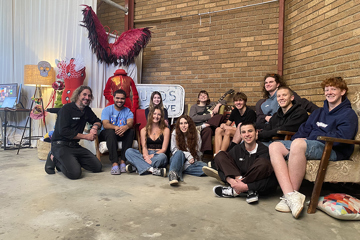Social Music
"Music is like a collage, an alchemy of elements which turn into something different again. It’s not easy – it’s always an act of will.”

"I said, 'Lady, are you in a fix?'/Then she reached for her purse and she pulled out a gun and said, 'Now, just shut up and keep your hands on the wheel'.” (Stan Ridgway – Drive She Said)
With a back catalogue full of gritty noir lyrics such as the above from his first solo album The Big Heat, all the way through to 2012 album Mr Trouble, Stan Ridgway could be called the Raymond Chandler of pop music. A bold claim, perhaps, but what is undisputable is the fact that Ridgway's career has been built on the impressive art of writing attention-grabbing melodies and soundscapes, and then filling them with rich, character-driven narratives. Some of these narratives are as hard-boiled as The Maltese Falcon, featuring wiley dames and dark deeds, others political or sometimes personal. He has composed music for pop-surrealist painter Mark Ryden, written an 'Apocalyptic Trilogy' with side-project Drywall, and managed to balance marriage with rock'n'roll (his wife Pietra Wexstun is one of Ridgway's most constant collaborators).
The loquacious Ridgway is headed for Australia bringing his arguably made-for-the-stage (half new material, half live recording) recent album Mr Trouble on tour. He speaks about the alchemy of songwriting: “It's a mystery, it really is, how an idea starts for a songwriter. I talk with other songwriters and we ask, 'Why are we doing this?' Most of the answers are: we're driven to do it – there's an obsessive compulsive element to being an artist, to examining something. I think it's really a matter of following your obsessions. And to have your audience feel somehow involved.”
For Ridgway, the values inherent in the experimental pop movements of the late '70s and early '80s are relevant now in an increasingly DIY digital world. But even back when he made his first record, doing it yourself was nothing new: for Ridgway, it all starts with Elvis. “You can go back to Elvis Presley, Howlin' Wolf and Sun Studios – recording in this itty bitty studio in Memphis. What they did [was] start a movement away from the larger machine of record companies, doing something new and fresh.”
Don't miss a beat with our FREE daily newsletter
On how digital – even mobile – devices have made it even easier to record and release music, Ridgway chuckles, “Now there's so much music being made it's hard to know what to listen to… We now have the ability to make a recording on very little money, for 30 dollars you can start, but on the other hand, it makes it possible for a lot of people who maybe shouldn't be making records – we really need to sort that out.”
What connects Ridgway's early records with his current work more than anything is the quest to make something different. “My motivations are still the same: to do something original,” he states earnestly. “To make something creative is an act of will. It's about not being run down by the big bulldozer of conformity. To be an artist is an act of will, a vocation. For some it can be a career, but I don't call what I do a career – it's my life.”
He admits, quite philosophically, that originality is elusive. “There's nothing new under the sun. The thing to do – what everybody's always done – is borrow from others and be a link in a chain, a hybrid. It's a new layering. Music is like a collage, an alchemy of elements which turn into something different again. It's not easy – it's always an act of will.”
Ridgway sees collaboration as one of the magic ingredients that create the alchemic originality. “The more people you have around you with similar interests the easier it gets to have good ideas. Music is a social thing. Everyone needs a certain amount of private time, but without other people involved, music isn't nearly as interesting.”







